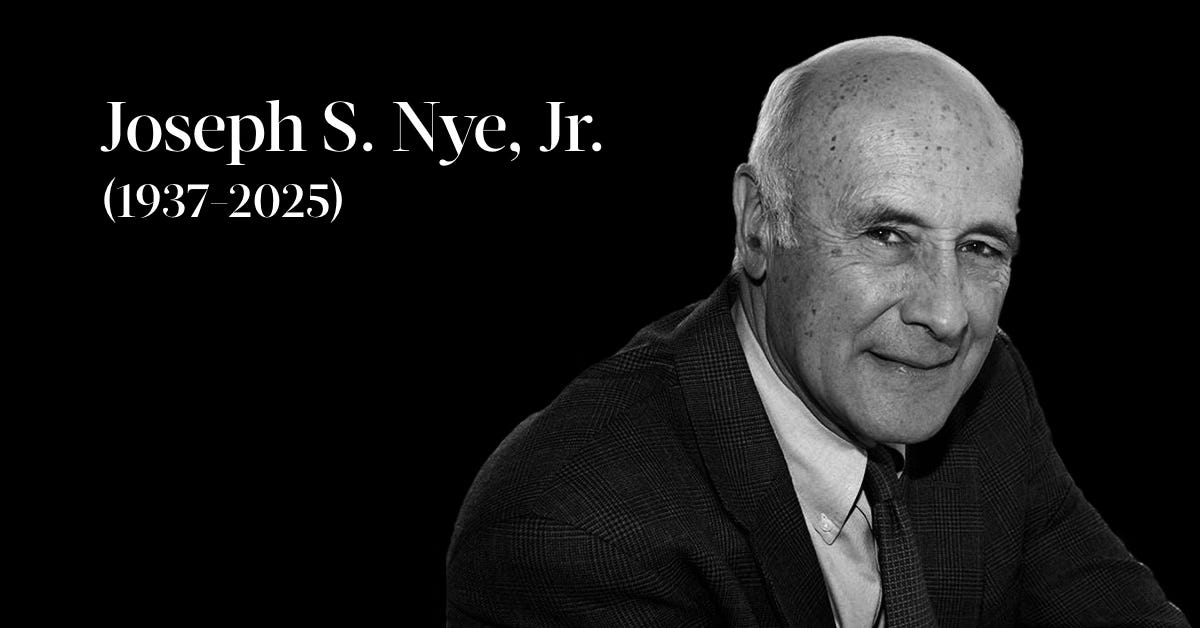Joseph Nye's Legacy and the State of American Soft Power
Do hard times call for softer methods? The U.S.' answer is clear.

Hello everyone,
I am Daniele Carminati, a lecturer in International Relations at Mahidol University International College (MUIC). My research interests revolve around the sociocultural, economic, and political implications of globalization in East and Southeast Asia with a particular focus on soft power dynamics and connectivity in its multiple forms (e.g. China’s Belt and Road Initiative).
This is my monthly newsletter covering the fascinating and multifaceted realm of soft power within the field of International Relations and related disciplines.
More about me and my work: LinkedIn | Academia | Research Gate
I did not expect that my inaugural post for this monthly newsletter about Soft Power dynamics would coincide with the passing of Joseph Nye, the scholar who coined the term in the late 1980s.
The announcement came suddenly, in early May, and it meant that I would never be able to meet him in person, while I am left wondering if he at least stumbled upon my humble-but-developing research portfolio and publications in the past few years.
Regardless, I was glad to see a plethora of responses from people who had the pleasure to meet him sharing fond memories and words of recognition for whom appeared to be a genuinely agreeable person.
In this first post, I gather a selection of articles to remember his work and indelible contribution to the theory and practice of the field of International Relations and international relations at large.
Project Syndicate published a tribute followed by a collection of Nye’s many contributions (41!) to the magazine. The editors note that Nye warned several times – until his very last commentary – that Trump’s actions are damaging American soft power; a common theme that is even more frequent since re-election.
Foreign Affairs, similarly, gathered a collection of influential articles penned by Nye since 1984.
Foreign Policy crafted a reading list devoted to the scholar, inclusive of its seminal article from 1990. Among others, the selection includes a nostalgic piece claiming that Nye was “the Champion of a World That No Longer Exists.”
This position was further elaborated in a more critical take that appeared in The Hill claiming that “ethical power politics should die too.” I disagreed with this position – arguably US-centric – in a LinkedIn post, as many actors beyond the U.S. are embracing soft power strategies.
The Harvard Kennedy School – where Nye spent six decades as a professor - and the USC Center on Public Diplomacy - devoted to the study of what is often referred to as the main tool of soft power – both paid tributes to the scholar, gathering comments from colleagues and fruitful research collaboration respectively.
Browsing more tributes, I was particularly captivated by a couple quotes. The first appeared in the South China Morning Post wondering “how will China remember” the scholar, as “his ideas were widely praised, [but] his attitude towards Beijing was not as friendly as believed.” More startlingly, the author suggests that Nye’s “passing may truly mark the end of the American century.” Only time knows.
To conclude on a more positive note, Edward Luce, in the Financial Times, described the scholar as “unfailingly kind, curious about what other people had to say, and never disagreed disagreeably.” In short, Nye “personified American soft power at its best.”
Referring back to the subtitle of this post: “Do hard times call for softer methods?” The American answer might be clear, but there are plenty of other international actors who disagree – and I do too – hence this newsletter.
I have now devoted nearly a decade to the study of soft power – including my PhD dissertation – and I am as eager as the first day to (help to) bring some clarity surrounding this oft-misunderstood concept both in theory and practice, with a particular focus on East and Southeast Asia’s dynamics of attraction and influence.
For the time being, this newsletter will take the form of a curated selection of links accompanied by brief commentaries, although thematic editions might follow in the future.
Additionally, links to events such as webinars could also be included.
See you in a month.



